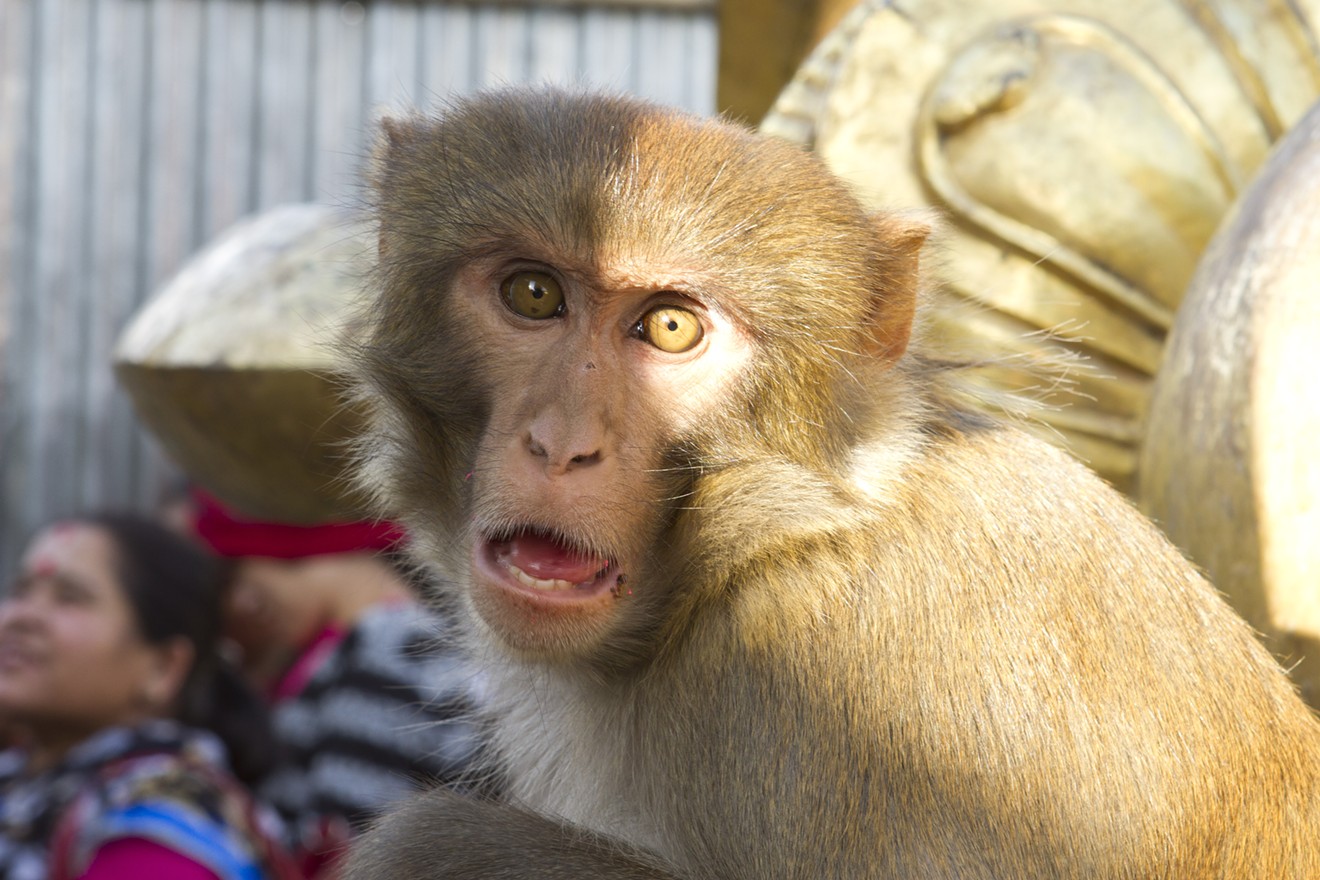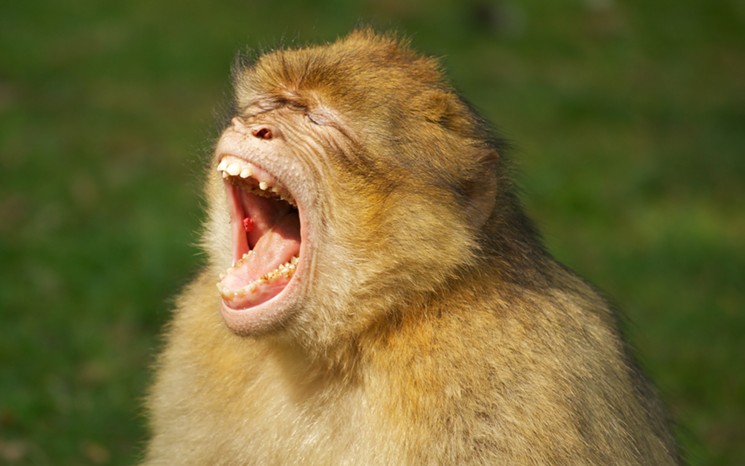Monkeys are running around Florida with a strain of herpes that can kill you. A recent study published in the Centers for Disease Control and Prevention's Emerging Infectious Diseases Journal shows that among the several hundred rhesus macaques living in Central and North Florida, about 30 percent of the monkeys sampled were infectious carriers of herpes B.
"Researchers at the University of Florida have been researching the ecology of those monkeys for a number of years," explains Dr. Samantha Wisely, an associate professor in the University of Florida's department of wildlife ecology, and conservation and one of the main contributors to the study. "I joined the team in 2015 specifically to ask the question: Do the monkeys in Silver Springs State Park have herpes B virus, which is a known virus that these rhesus macaques can have."
You've seen these monkeys before. They're the little scamps often referred to as temple monkeys, running around cities in Southeast Asia, stealing food, sometimes even snatching people's stuff and holding it hostage. And if you've ever seen a PETA commercial about animal testing, you've probably been stared at by a sad monkey in a cage. More often than not, according to Wisely, the rhesus macaque is used in those laboratory settings.
And it's been in that setting that researchers have discovered firsthand the danger of herpes B. "There have been documented cases of people contracting herpes B from captive animals and dying... almost always laboratory workers that have been bitten or scratched and then contracted the virus," Wisely explains. "And about 50 percent of the time, they died because it’s a very virulent virus."
What's bizarre, and a bit reassuring, is there are no recorded cases of this monkey-to-human transmission of the virus outside the laboratory. But even though the number of cases has been relatively limited, the risk carried in having any contact with these monkeys is enormous. "We call it a low-risk, high-consequence pathogen. That means that the risk of contracting it is quite low, but if you get it, the consequences are dire. Fifty percent of the time, people die," Wisely warns. "And to give you an example, another pathogen that we think of as low-risk, high-consequence is rabies."
So why isn't there a huge fatality rate from herpes B in places such as Nepal, India, and Indonesia, just a few of the countries where human interaction with macaques is strikingly commonplace? Why haven't there been any cases around Silver Springs, where a group of monkeys recently chased a family out of a state park? According to Wisely, the answer probably has to do with the nature of the herpes virus. Just like herpes simplex in humans, herpes B can become latent once it's been introduced to the monkey's bloodstream and its immune system has had a chance to make the virus dormant. At that point, the monkey becomes a noninfectious carrier of the disease.
"But if an animal becomes stressed," Wisely says, "then the animal lowers its immune efficiency and the virus starts to recirculate in the animal and starts to shed." When that happens, the virus is again infectious and is spread through the monkey's blood, saliva, or feces. According to the study, that usually begins to happen in the wild when these monkeys enter their mating season, which is in the fall. That's when things can get dangerous for humans.
"One of the defining features [of herpes viruses] is that they tend to cause very little clinical illness in the species in which they evolved," the doctor notes. "But if a human herpes virus ever gets into a monkey, it almost always kills the monkey, and if a monkey herpes virus ever gets into a human, it almost always kills the human." If that statement sounds at all familiar, that's because it's basically analogous to the way the simian immunodeficiency virus, which had little known effect among the population of monkeys that carried it, affected humans when it spilled over and mutated into what has grown to be one of the most harrowing world health epidemics in history: human immunodeficiency virus, or HIV.
The Florida Fish and Wildlife Conservation Commission (FWC) has acknowledged the danger posed by these monkeys since the report was released and has stated that it supports removing them from Florida. There are a couple of problems with that plan. First, it's not entirely clear how many of the monkeys live in Florida. What's more, the state doesn't appear to have a strategy for managing the macaque population. Asking residents to hunt them down, as the FWC has done with the highly invasive Burmese python, would be dangerous. Monkeys are much smarter and more agile than pythons — and don't forget they might be carrying a virus that could kill you.
One thing we do know: These monkeys aren't just in one place anymore. The macaques were introduced to Florida in the 1930s when a boat captain was hired to release a dozen of them into Silver Springs Park, which at that point was privately owned. The idea was that the monkeys would help boost tourism. Since then, the population has exploded.
"We know that they have expanded outside of the park and that they exist on people’s private properties," Wisely says. "Typically, those people aren’t very happy that they’re around... They’ve been reported in Orlando; they’ve been reported in Tampa; people have sighted them in Tallahassee and in Sarasota. So they are in numerous locations throughout the state."
[
{
"name": "Air - MediumRectangle - Inline Content - Mobile Display Size",
"component": "19274298",
"insertPoint": "2",
"requiredCountToDisplay": "2"
},{
"name": "Editor Picks",
"component": "17482312",
"insertPoint": "4",
"requiredCountToDisplay": "1"
},{
"name": "Inline Links",
"component": "18711090",
"insertPoint": "8th",
"startingPoint": 8,
"requiredCountToDisplay": "7",
"maxInsertions": 25
},{
"name": "Air - MediumRectangle - Combo - Inline Content",
"component": "17482310",
"insertPoint": "8th",
"startingPoint": 8,
"requiredCountToDisplay": "7",
"maxInsertions": 25
},{
"name": "Inline Links",
"component": "18711090",
"insertPoint": "8th",
"startingPoint": 12,
"requiredCountToDisplay": "11",
"maxInsertions": 25
},{
"name": "Air - Leaderboard Tower - Combo - Inline Content",
"component": "17482313",
"insertPoint": "8th",
"startingPoint": 12,
"requiredCountToDisplay": "11",
"maxInsertions": 25
}
]













